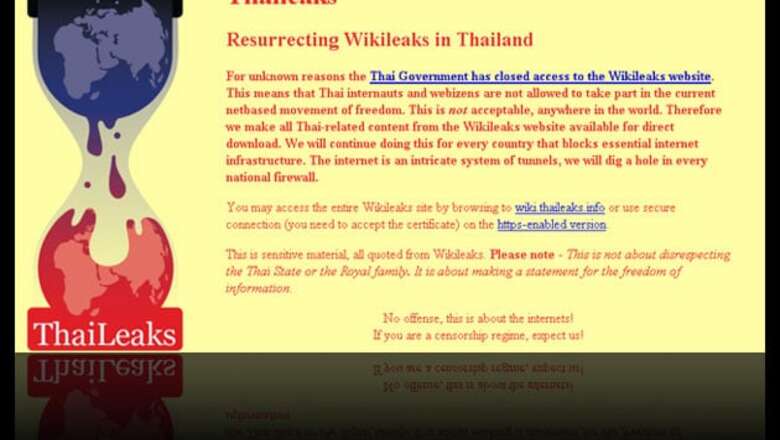
views
Bangkok: A group of anonymous Internet activists has set up a website to display information about Thailand that comes from the whistle-blower site Wikileaks, which is blocked to some viewers in the Southeast Asian country.
The group calling itself "Wikicong" said Friday it set up the thaileaks.info site as "a tool to break the censorship" - an apparent reference to alleged efforts by the Thai government to block access to the material, which includes a private video of the country's Crown Prince Vajiralongkorn.
Some access to the main Wikileaks site has been blocked in Thailand since at least late June. It has been accessible, however, using some variants of the domain name, and through some local Internet service providers.
Wikileaks drew worldwide publicity in late July when it posted a huge trove of secret U.S. military documents about the war in Afghanistan.
Aree Jiyorarak, director of the Computer Crime Office of Thailand's Ministry of Information and Communication Technology, told The Associated Press that Wikileaks is not blocked by his office, but may not be accessible because of a technical glitch.
"I know some people said that the website is blocked, but it's only a server problem," he said. "I can access Wikileaks from my office. I can assure you that the website is not blocked."
Aree said about 1,300 websites were now blocked, mostly because they stream or have links to videos of political gatherings in Thailand. Other estimates put the number of blocked sites in the tens of thousands.
Thousands of anti-government demonstrators besieged the Thai capital for two months before a military crackdown scattered them in May. The street clashes between so-called Red Shirt protesters and government forces killed 91 people and injured more than 1,400, and Thai authorities have been wary about further unrest.
The most sensitive material about Thailand on the Wikileaks site is the video of the crown prince, heir apparent to 82-year-old King Bhumibol Adulyadej, having dinner with the woman who later became his wife. The video had been widely circulated inside Thailand, which has a strict lese majeste law that mandates a jail term of up to 15 years for anyone who "defames, insults, or threatens" the royal family.
In a "Message to the Government of Thailand" posted on its website, Wikicong dared Thai authorities to block the Wikileaks data. "We don't worry much because there are hundreds, maybe thousands, of internauts ready to make that information reach its true destination: the people of Thailand," it said.
Contacted by e-mail, Wikicong said it began setting up the alternate site Wednesday, shortly after a widely circulated news report said Wikileaks had been shut down in Thailand. It said it has "no official ties" to Wikileaks.
"Wikicong is defending freedom of information everywhere, and right now we experience that Wikileaks is the target of several states and organizations who wish to stop them. We have stepped up in defense of their work," the group said.
Web censorship has occurred for years in Thailand. Reporters Without Borders says more than 50,000 websites or individual pages have been blocked. The pace of censorship picked up after a 2006 coup deposed then-Prime Minister Thaksin Shinawatra, setting off the sharp political battle between his Red Shirt supporters and government backers.
A Computer Crime Act enacted in 2007 by an interim military-installed regime bars the circulation of material deemed detrimental to national security, or that causes public panic.
A state of emergency was declared after the recent protests, allowing the military to apply censorship without normal legal restraints. Satellite TV broadcasts and print publications were targeted, in addition to websites viewed as supporting the Red Shirts.
"In this instability, censorship might make sense to some people, but there's the risk of increasing opposition and dissent," said media activist Supinya Klangnarong. "If Wikileaks is blocked, then next could be YouTube and Facebook. Then Thailand would be known for being the enemy of the Internet."


















Comments
0 comment